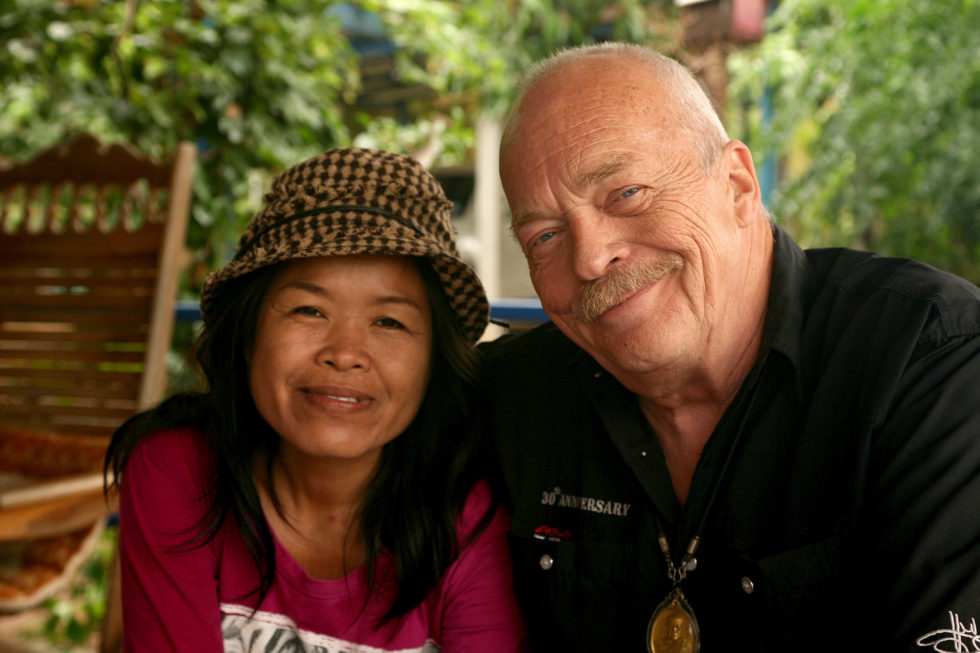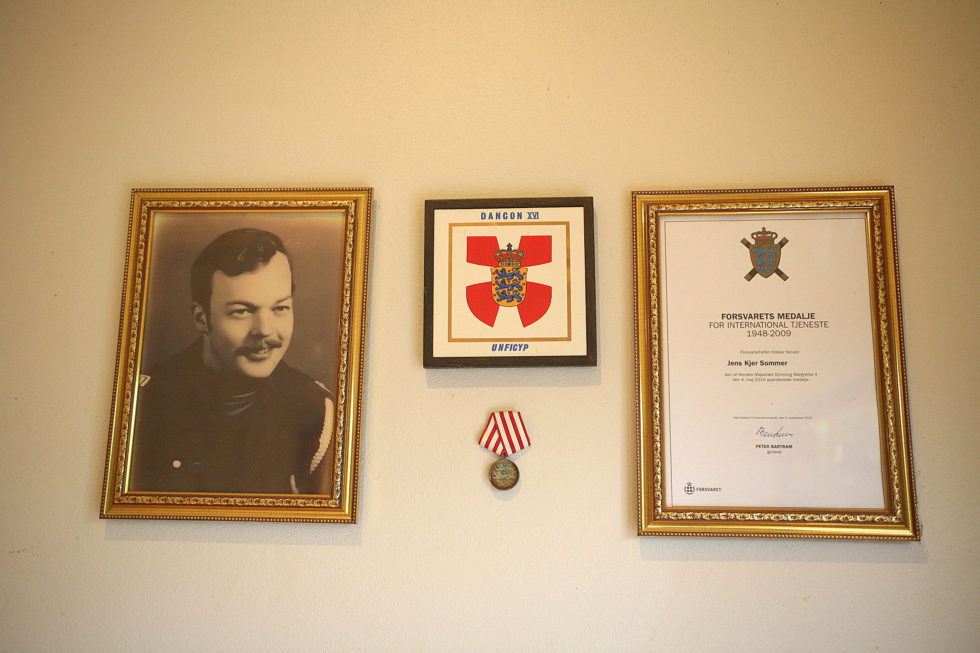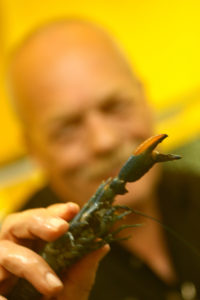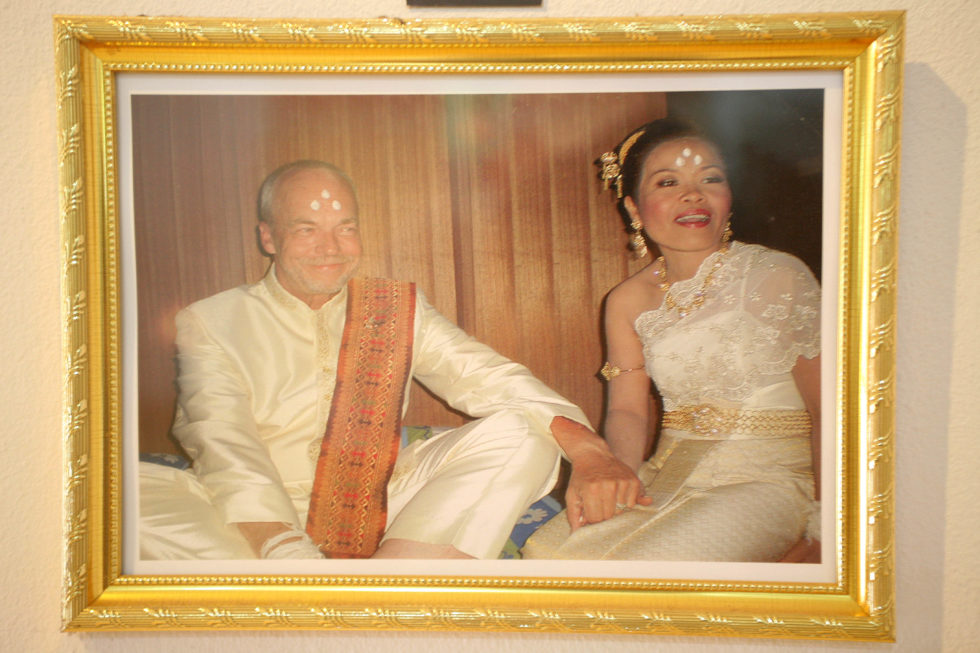If you drive 70 miles east of Udon Thani on the highway, you will see a small bridge leading away from the road. Crossing that bridge will lead you down a narrow concrete road and the further you go, passing rice fields, small villages and numerous temples, the more decayed the road becomes.
Continue on that road for about thirty minutes and you will see a large, beige house on the right and on the porch sits a small but largely build man. His name is Jens, and he is the only farang nearby.
“And that’s just the way I like it.”

Military police
By the time Jens Sommer – later to add Chanthasook to his name – first set his feet on Thai ground ten years ago he had fought gangs in the seventies, crashed more cars than any other police officer in his district, been shot at in Cypern as a UN soldier and gone from a family man with his own company to living on the streets in the winters of Denmark. And now he has a small lobster farm in the the most rural of areas in Thailand.
But the story begins in Kgs. Lyngby in a grey, “boring” apartment complex on Chr. X’s Allé, where he grew up. He had an atheist father and a very religious mother and as he says, “I was pretty much just chasing after my mother.”
Come 18 when every boy in Denmark must show up at the military to pick a number. Low number and you’re in for a year, high number and you’re free to go. Jens got a low one.
“I really didn’t want be in the military; exhaustion and torture wasn’t a part of my life,” he says and adds “but unfortunately I’d mentioned that I wanted to join the police when I was done, and before I knew it, I was part of the military police.”

So for four years his job was to make sure that the rest of the recruits didn’t cause too much chaos when they were going home for the weekend – breaking up fights and trying to keep the least amount of order needed for the military.
In a quiet war zone
After his time ensuring order within the military, Jens volunteered as a UN soldier in Cyprus in a time, where peace was at large between the Greeks and the Turks.
“Most of the violence were bar fights, but we did experience one shooting. When that happens, you go vertical pretty fast,” he says and laughs. “It was a good time though and I kind of learned that I liked that, so when I came back, I applied for the police academy.”
And with that, one of the more tense parts of Jens’ life begins. The life in the police force in one of Zealands hardest areas, the outskirts of Copenhagen.
Lobsters

Jens picks up a small lobster in a shed behind his house in Thailand. He studies it for a while before showing it to the curious crowd. The rain pours outside and the ground is just as wet as the tubs containing the lobsters. Everyone is soaked from the small walk between his house and the shed in the backyard.
“This one’s pregnant,” he says, holding a visibly larger red-claw lobster in front of him. As he puts it back into the tub, it sprints into a small, grey pipe, its small legs popping manically, almost like Bambi on ice.
“It’s just a hobby. I got the remains of a friend’s farm after they kept dying on him. For now they seem to be healthy, but if I can get the right lobsters to breed, I might be able to produce enough to sell locally
The rough guys
“We had 31 registered gangs in our district that we were told to stop by any means necessary. So we did,” he says with a subtle smile. “Outside of Copenhagen there are not a lot of people meddling in what you do. In the city they always had the press breathing down their neck.”
And Jens has a very relaxed attitude towards what would be labeled as police brutality today.
“It wasn’t unusual that we gave a guy a small beating rather than arresting him, but our district was also the kind that the top tried to keep in the background until it got really serious. It was a lot of fun…”
And during his time in the force he got the nickname ‘The Car Wrecker’ because of his tendency to – well – wreck cars. In his 22 years of service he totaled five cars:
“Like this one time we were chasing a guy on a fixed scooter through some rape fields, which by the way is not good for the underbody at all. But I wasn’t aware that the field had a hidden well inside of it. We had to be picked up by another patrol,” he says.
The only farang
As the years progressed, things seemed to decline for Jens. He briefly owned and operated a small printing company in his cellar, away from the action filled life of the Force. Unfortunately he quit his job at the police almost simultaneously with the last crisis of the printing press – the one that cost most typographers their jobs, including Jens.
“I survived two bankruptcies but the third one cost me my house, my car and after a while, my family.”
The divorce was by several unstable years on and off the streets of Copenhagen, making a small buck as a taxi-driver while surfing from home to home.
“I told myself I would never re-marry after the divorce, but a friend of mine adviced me to go on one of those dating-sites for Thai women. At first it was all fun and games, but the 8th of March 2008, a messaged ticked in.”
It wasn’t more than three lines:
Hi Jens
My name is Nonglak. I am 37 years old and I live in Thailand, I love your profile
Love and kisses. Nonglak, followed by a couple of pictures.
“That was all she needed, I was sold. It wasn’t long before I proposed to her on Skype, by mail and by phone and she said yes every time. Naturally I was a bit sceptic at first, but as an old police I know how to ask questions and Thais are generally not that good at English, so I could ask the same questions phrased differently. And the answers were always the same.”

Nine days after he arrived in Thailand, they were married in a traditional Buddhist wedding. They build a large house in Jew’s village, where they still live.
And today, if you manage to find the right exit on the highway from Udon Thani, you’ll see a white man sitting on a porch in a village with a big smile on his face. Local children drive by, waving and giggling. Once in a while a monk will come to the house for some food
That’s Jens Chanthasook Sommer, and he’s the only farang in town.
